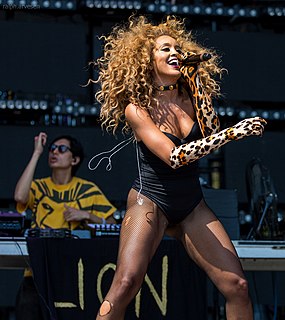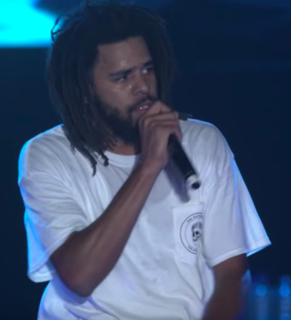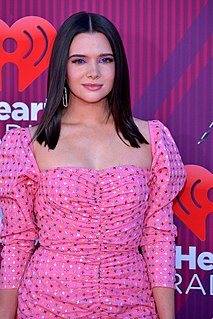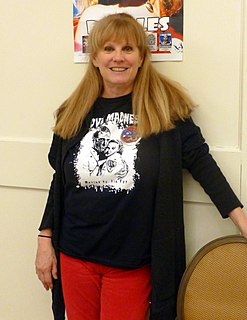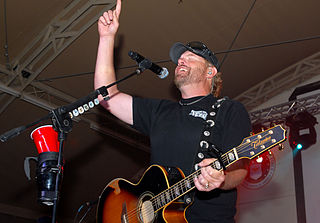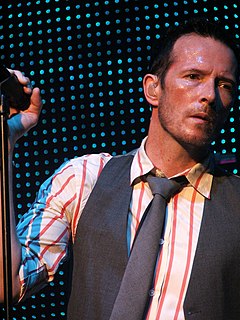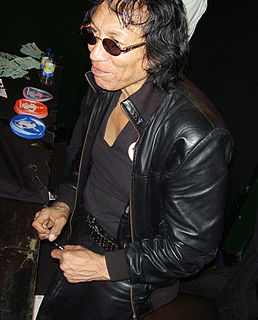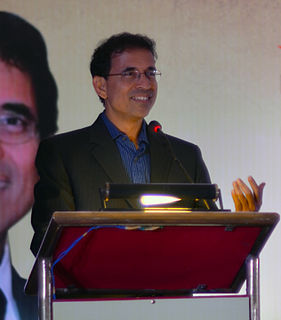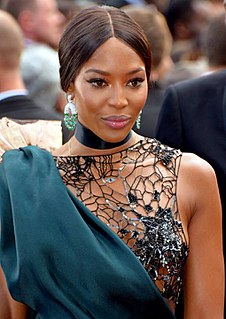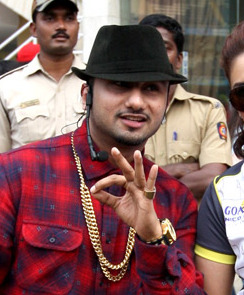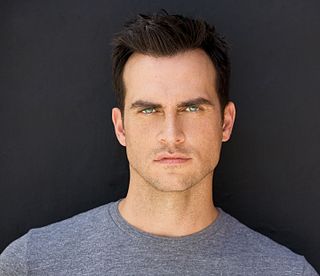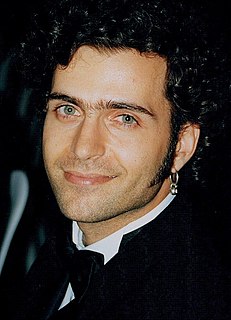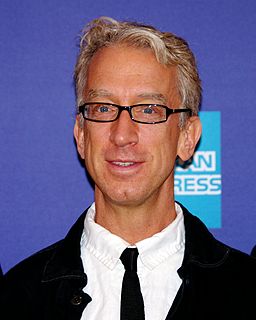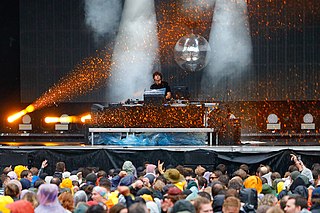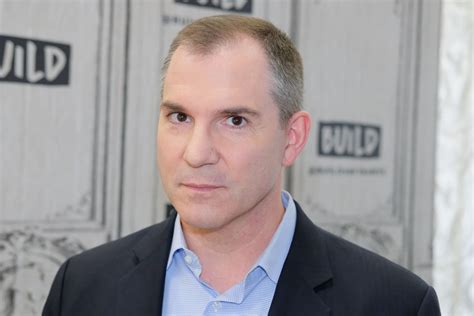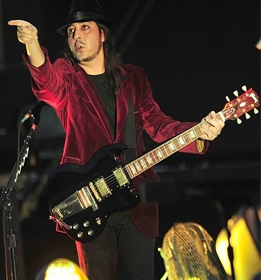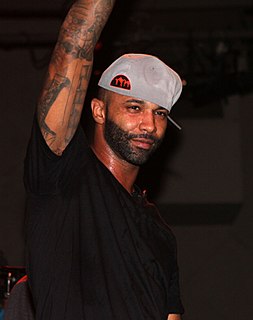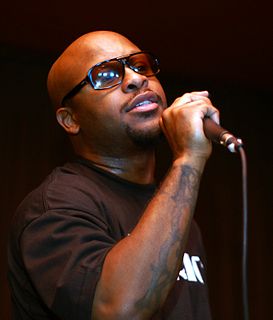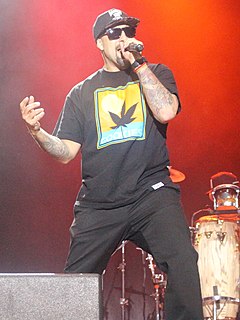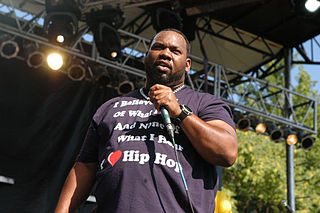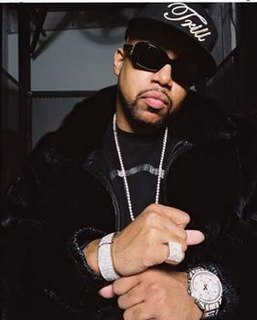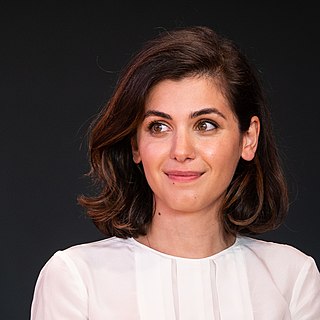Top 1200 Album Cover Quotes & Sayings - Page 10
Explore popular Album Cover quotes.
Last updated on November 15, 2024.
My friends make me laugh: funny Instagram videos, but mostly people falling over. It's so bad, but it never gets old. I just love how people cover up their falls. The whole experience of 'Oh, I just fell, and I'm going to run out of the fall and pretend I did this on purpose.' I just like to see how people cover up their mishaps.
It's not necessarily a church theme and it's not really about church. I like my album themes to be metaphors because it gives me the freedom to speak about something else that's going on in my life, so the Born Sinner thing is not about church, it's not even about religion. It's using that as canvas to get other messages across and that's what the album will be.
I really consider myself fortunate to have been of age during the musical revolution that came in the form of the Beatles. People don't realize that previous to the Beatles, there really was no such thing as an album artist. People made singles. Then they would put a bunch of those singles together and call it an album. And that was it.
It's either, like, 'Your album was the first jazz album I listened to,' or, like, 'My friend took me to this show, and I've never been to a jazz show before, but, man, I'm so happy I came. I can't wait to go home and see more.' And you can feel it in the crowd, too. You can see the groups of people that don't really know what to expect.
We kept moving forward and didn't try to recreate the past .. the approach to each album was radically different every time. Many bands would have some success and, because they were locked into having a single - something we didn't have to worry about - they had to make sure there was something similar on the next album ... that was never the idea with Led Zeppelin .. the goal was to keep that spark of spontaneity at all times.
At 7 in the morning, Rob Zombie calls. I just let the machine answer it, because I'm like, "Who's calling me at 7 in the morning?" It's Rob leaving this message, going, "That was the best birthday present I ever got in my whole life. I looked at Halloween script from cover to cover. No one else will ever get their fingers on this. It's wrapped in plastic. It's going in my vault. I love it. Thank you."
You're not going to hit it every single time, and that's why, when I record an album, I do probably close to 50 songs. Each song I record has to get better. If it's not better than the last song that I made, it'll usually linger for a couple of months, and then it'll be put on the backburner, and then there'll be another song that I do, and then it often doesn't make it on the album.
In a way, I think this album is stronger than the last one - in terms of not hiding behind anything. So in a way, I see this album as fiercer than the last. I just find it interesting hearing what people think. If that's people's interpretation, then that's valid and interesting. It's hard to try and neatly place a record like that.
I'd had my whole life to write my first album. I had my No. 1 and my third single out, and they go, 'Hey, guess what? We need to start recording the next one.' I'm like, 'Uh oh, I got to write another album. Well, how am I gonna write 'Should've Been a Cowboy' and 'Ain't Worth Missing' and all that again?' It took me forever to write the first one.
Obviously, this is our first album [Begin], so this is our first big body of work that's out there in the world and it really represents our journey, from where we started to now and all the music we created, our range, and all the things that we definitely shared, but weren't able to show our range on a full-scale until this album.
When I formed the band and created the Wildabouts with my friends, we decided we wanted to make a band-sounding album, a rock-sounding album. I made two solo albums before that were more experimental albums, and I think that they didn't really resonate with my fan base because they were too out-there, too artsy.
I never thought of myself as a sex symbol. I just do the cover of magazines. I think it’s really unfair men or people in the world think you can’t be both – you can’t be a sex symbol and a serious businessperson. Who says I can’t be both? Who says I can’t do the cover of Maxim and run a production company? Women are complex. Women are beautiful and intellectual and spiritual and social and entrepreneurial. They’re everything. And I think I’m a great example of that.
In my opinion, I would still like to go into a studio - because I love the environment of being in a studio - and record a great album beginning to end, but then maybe not release it as an album. Maybe put singles out there, put songs out there - either give some away or release some the traditional way.
I've always dreamed of having an album. The problem is that it's just very difficult to make an album nowadays because through technology, music shifts so fast, especially electronic music. Once you make five songs, the first one you did is already old and you wished you would have put it out right away. So that's kind of the difficult part.
I really am convinced that what is happening in media today is the result of the birth of conservative media and its rapid growth and ascension. It has destroyed the left's monopoly in media. When they had the monopoly, they could pretend that they were not what they are and get away with it. They could pretend to be objective. You know, the power of a monopoly is not just determining what stories you are going to cover, but what you don't cover is just as powerful.
Patrick Demarchelier was the one who got me my first 'Vogue' cover. It was French 'Vogue' - I think in '87 or '88. I think I was the first black model to be on the cover of French Vogue, which was shocking to me because when I asked them about it, they were like, 'Oh, no. We've never had that before.'
Things like, people saying the new album would debut at number one on the Billboard Charts in the U.S. and I said, "No it's gonna be number Three." Because Number 3 is a very powerful number on the album. It's repeated quite often. Then it did chart an Number 3. Was it a coincidence you decide. If your in touch with your subconscious, you can really use it to your advantage
In 2011, I released my first album called 'International Villager.' I had no support, and whatever money I had made, I put it all in the album. I shot the music video for 'Brown Rang' with one lakh dollars. I spent so much money, as I just wanted to put it up on YouTube, as I knew that my market was there, and it became a huge hit.
You sing songs hundreds of times over and over, but certain ones just morph and naturally, as you age and get life experience, take on a different form as well. When I was looking at songs for the album, I thought, "Which are the ones that connect with me the most? What do I think would work in album form?" Almost all of them I've done in shows.
I have a song I wrote called “Autobiography.” I came from a very intense living situation, with having a parent on drugs and not having a lot of money. So I always want to talk about the real things. But I think 90 percent of my music, I want it to be 'feel-good music'. I'm already recording tracks for my album, but when it comes time to actually say, 'this is the album,' I may be in a completely different space than I'm in right now.
I wrote an album about being in love. I don't think it's possible to write an album while you're in love - why on earth would you bother? I mean, Christ. If you're in there writing songs about someone rather than just being with them and kissing their every molecule, surely the person that you're with must be asking some questions as well.
Everybody else goes out and plays a show as if it's their album, which is boring. I'd rather sit at home and listen to the album, because I hate to be in a smoke-filled, loud room - that's not enjoyable for me at all...I always look up to guys who can sit and do dinner music...they're singing in tune and playing somebody else's music, and I don't think I could do that...it's the shittiest job in the world.
Rachel Dolezal stepped down from her position as president of an NAACP chapter after it was revealed that she was a white woman pretending to be black. Now her brother says he knew about it but she asked him not to blow her cover. Unfortunately, her cover had already been blown by God when he made her a blond-haired, blue-eyed white lady.
I suspect that relatively few people will sit down and read 1250 pages [ of The Enduring Authority of the Christian Scriptures.] all the way through from cover to cover. There may be some, but not everybody. But there are many, many, many different Christian, theological, pastoral, specialisms that are covered by one section or another of the book and this will become, therefore, a resource volume for many people.
I don't really marinate in anybody's album because I don't really want to sound like anybody else when I put my album out. So I'd rather not even be tempted to listen to a bunch of other stuff with any degree of emersion in it, cause I just don't want to sound like anything else, so I kinda focus on my own music.
It turned out so well because it was the first album that I could identify with in terms of lyrics. ("Captain Fantastic") It was passionate...I could associate myself with every song...It's a unique album in our history. This was the story of us..."Curtains", the lyrics to that are so beautiful because it sums up our friendship so much, and our relationship.
It doesn't make sense for me to try to be, like, a dance dude who only releases two 12-inches a year and then plays every weekend. Making an album, you get to put out a body of work that shows a lot of different sides of you. And you get to work on it for an intense period of time and promote that album. And then you get to move on.
We still write too many stories that are "state of the race" stories that are informed almost solely by what the polling shows and by what we're then deducing about who's up, who's down, and I'm just not sure that's very helpful to readers, it certainly doesn't elevate the debate and, and the problem is if you, if you cover these things, and I don't think the Times is particularly culpable, I think other news organizations are worse, if you cover them in an entirely "who's up, who's down" horse race way.
Very rarely are you going to see the large shareholder or CEO of a corporation march into a newsroom and say, "Cover this story, don't cover that." It's a much more subtle process. The professional code adapts, but what we try to see, is how commercial and corporate pressure shape both the professional code and the sorts of things that are considered legitimate journalism and illegitimate journalism.
I did some reading to prep for Expelled. I read one book cover to cover, From Darwin to Hitler , and that was a very interesting book - one of these rare books I wish had been even longer. It's about how Darwin 's theory - supposedly concocted by this mild-mannered saintly man, with a flowing white beard like Santa Claus - led to the murder of millions of innocent people.
With our last album ("No Time To Bleed"), we recorded most of it in New Jersey. And with being on the road 9 months a year, recording an album on the other side of the country- it just wasn't a good experience for us. All I wanted to do was go home and see my daughter, so for us to only be a couple hours away was huge- I could go home if I needed to.
A brilliant 1989 album, Oh Mercy; some career retrospectives; and two albums of American folk songs, with just Bob Dylan and his guitar and harmonica. All that culminated in the Grammy-winning comeback album, Time Out of Mind (1997). Once again, just as Dylan seemed to be out of it, he was back at the top of his game.
I didn't set out like, "I'm gonna do this album, and I really want a #1 album." So it wasn't even on my mind like a goal to accomplish... but as soon as it sunk it that it was an accomplishment, I realized I gotta start acknowledging milestones [I've] accomplished because sometimes you get so caught up in the bigger picture that you gotta stop and notice the steps you take to get to the bigger picture.
For 'The Grey Album,' I'd been thinking about the good side of lying - lying as a kind of improvisatory act in black culture. Afterward, it nagged at me because there are those other kinds of lies that I think are all around us, and I was fascinated about hoaxes in general. So 'Bunk' became a natural extension of 'The Grey Album.'
Obviously yeah, but our first album took us five years to put together, to get signed and to put it out, we had a lot of time to think about what we were doing. Black Sunday was like a whirl wind, we had to rush back to the studio after touring, but the last album we had a little longer, what like eight months?
For me there's insecurity when you're releasing an album because you spend all of this time working on that one thing and then once it's done, it's done. After you put it out there to the public you never know which songs are going to work or even if the album is going to work as a whole so there is a little bit of nervousness around predicting what the numbers will be and if it's going to be well-received.
Whether you hear me come out with another album or whether you hear any one of the Clan members, we're always going to involve everybody. When I look at 'Only Built 4 Cuban Linx, Part II,' I look at that as a Wu album. You feel me? Even though it was my brand and my thing that I done, I had my dudes on it.
I wanted to reexamine the idea of the album for generations of people who are not my age, who love music or learning about music or are finding this band called R.E.M. or have just previously heard "Losing My Religion" and "Everybody Hurts" as their elevator music. I wanted to present an idea of what an album could be in the age of YouTube and the Internet.
A lot of times when you see Bun you don't see me; that's because we have to go our separate directions to promote on our own. When we're separate, we can cover more ground than we can together. That doesn't mean that it's not still UGK for life; we've just figured out ways to promote and cover more ground.
Our cover has always been really important. For those of you who haven’t seen itCharles Burns, who is a graphic artist, does four portraits, so it’s split into quadrants and there’s four heads, basically—portraits of people. We’ve actually often thought and freaked out, what if something happened to Charles Burns? Because he’s so identified with the cover of our magazine, I don’t know what we would do if anything happened to Charles Burns.
I just don't know artistically - because I don't write my own music - I don't know artistically what an album would mean for me. I don't know what I would want to say with an album that would be unique to me - something that hasn't been done before. I'm just not sure what that is. But I'm absolutely open to it.
